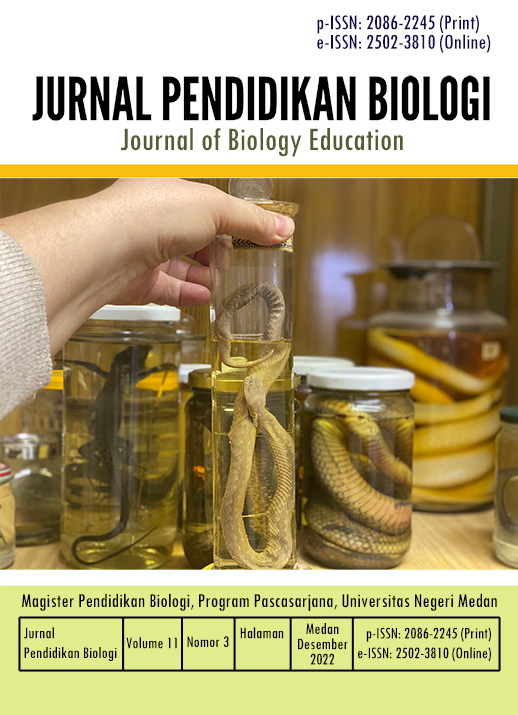The Effect of Reciprocal Teaching Learning Model on Student Learning Outcomes
DOI:
https://doi.org/10.24114/jpb.v11i3.39400Keywords:
Learning Outcomes, Reciprocal, Teaching ModelAbstract
The learning process is important because human learning can add and update knowledge that is useful for the future. Science is growing from age to age, so the learning process will develop and the learning methods will be more varied. One of the learning methods that can be applied is the method reciprocal teaching which is one of the effective methods because it trains students' process skills. This study aims to see how the effect of using the method on student learning outcomes, this type of research is pre-experimental research by giving pretest and posttest treatments to one experimental class. The sample of this research is Biology Education students of FKIP UMMA in the Basic Microbiology course program with a total of 26 students consisting of 13 male students and 13 female students where the sampling method used is Purposive Sampling. One experimental class was taught using the Reciprocal Teaching learning method. The research instrument used was a multiple choice test of 20 items which had been validated by two experts, namely content and language experts. The research data were analyzed descriptively and inferentially. The results of this study indicate that there is a higher effect on student learning outcomes who are taught by learning using the reciprocal teaching model than before being given the treatment. These differences indicate that the reciprocal teaching model is an effective learning method used in these subjects because this learning model trains students to be more active and enthusiastic in the learning process.References
Adhani, A. (2014). Pengaruh Strategi Pembelajaran Reciprocal Teaching dan Kemampuan Akademik terhadap Aktivitas Lisan dan Hasil Belajar Kognitif Biologi. Jurnal Pendidikan Sains, 2(3), 148“158.
Adiwijaya, H., Suarsini, E., & Lukiati, B. (2016). Penerapan Pembelajaran Reciprocal Teaching Berbantuan Peta Konsep Untuk Meningkatkan Kemampuan Berpikir Kritis Siswa Pembelajaran Biologi. Jurnal Pendidikan, 1(12), 2379“2387.
Agoro, A. A., & Akinsola, M. K. (2013). Effectiveness of reflective-reciprocal teaching on pre-service teachers™ achievement and science process skills in integrated science. International journal of education and research, 1(8), 1-20.
Akinsola, M. K., Tella, A., & Tella, A. (2007). Correlates of academic procrastination and mathematics achievement of university undergraduate students. Eurasia Journal of Mathematics, science and technology education, 3(4), 363-370. https://doi.org/10.12973/ejmste/75415.
Anas, M & Murti, W. (2021). The Effectiveness of Google Classroom Learning Applications on Student Learning Outcomes. Jurnal Biosfer. 12(2), 99-109. https://doi.org/10.24042/biosfer.v12i2.9723.
Aris, S. (2014). Model Pembelajaran Inovatif Dalam Kurikulum 2013. Yogyakarta: Ar-Ruzz media.
Danim, S. (2011). Pengantar Kependidikan Landasan. Teori, Dan Metafora Pendidikan: Bandung: Alfabeta.
Driscoll, M. P. (2000). Psychology of learning for instruction. Needham. MA: Allyn & Bacon.
Hamalik, O. (2011). Proses Belajar Mengajar. Jakarta: PT Bumi Aksara.
Izadi, M., & Nowrouzi, H. (2016). Reciprocal teaching and emotional intelligence: A study of Iranian EFL learners™ reading comprehension. The Reading Matrix: An International Online Journal, 16(1), 133-147.
Khusnia, D., & Nuraida, D. (2017). Pengaruh Model Pembelajaran Reciprocal Teaching (Pengajaran Terbalik) terhadap Hasil Belajar Siswa pada Pokok Bahasan Pencemaran Lingkungan. In Proceeding Biology Education Conference: Biology, Science, Enviromental, and Learning. 14(1), 484-489.
Mulyono, D., Asmawi, M., & Nuriah, T. (2018). The effect of reciprocal teaching, student facilitator and explaining and learning independence on mathematical learning results by controlling the initial ability of students. International Electronic Journal of Mathematics Education, 13(3), 199-205.
Murti, W., Maya, S., & Lestari, P. (2022). Pengaruh Penggunaan Buku Pedoman Praktikum Ekologi Tumbuhan Terhadap Hasil Belajar Mahasiswa. Binomial, 5(1), 13-24.
Ostovar, N, A.,I & Shahhosse M.R. (2011). On the Effect of Reciprocal Teaching Strategy on EFL Learners™ Reading Proficiency. Journal of Language Teaching and Research, 2(6), 1238“1243.
Pilten, G. (2016). The Evaluation of Effectiveness of Reciprocal Teaching Strategies on Comprehension of Expository Texts. Journal of Education and Training Studies, 4(10), 232-247.
Sahab, R. M. (2014). The use of reciprocal teaching procedure in teaching narrative texts to improve students™ reading comprehension. Journal of English and Education, 2(2), 81-90.
Sanjaya, W. (2011). Strategi Pembelajaran Berorientasi Standar Proses Pendidikan. Jakarta: Kencana Prenada Media Group.
Schunk, D. H., & Usher, E. L. (2012). Social cognitive theory and motivation. The Oxford handbook of human motivation, 2, 11-26.
Seli, I. N. (2020). Pengaruh Model Pembelajaran Reciprocal Teaching Tehadap Hasil Belajar Kognitif Pada Mata Pelajaran Pai Di SMA Negeri 1 Talang Padang Tanggamus. Doctoral Dissertation. UIN Raden Intan Lampung.
Siraji S. Z & Yusuf, M. G. (2014). Self Concept, Learning Styles, Study Habits and Academic Achievement of Adolescents in Kashmir. Anchor Academic Publishing.
Sugiyono. (2016). Metode Penelitian Kuantitatif, Kualitatif, dan R&D. Bandung: Alfabeta.
Trianto. (2017). Model-Model Pembelajaran Inovatif Berorientasi Konstruktivistik. Jakarta: Prestasi Pusaka.
Yusrizal, Y., & Fatmawati, F. (2020). Pengaruh Model Reciprocal Teaching dan Kecerdasan Intrapersonal terhadap Hasil Belajar IPS Siswa. Jurnal Tematik, 10(2), 90-95.
Downloads
Published
Issue
Section
License
Copyright (c) 2023 Jurnal Pendidikan Biologi

This work is licensed under a Creative Commons Attribution 4.0 International License.
Copyright
Penyerahan naskah menyiratkan bahwa karya yang diserahkan belum pernah diterbitkan sebelumnya (kecuali sebagai bagian dari tesis, laporan, atau abstrak). Naskah tidak dipertimbangkan untuk publikasi di tempat lain. Penerbitannya telah disetujui oleh semua penulis bersama. Jika dan kapan naskah diterima untuk publikasi, penulis masih memegang hak cipta dan mempertahankan hak penerbitan tanpa batasan. Penulis atau orang lain diperbolehkan untuk melipatgandakan artikel selama tidak untuk tujuan komersial. Untuk penemuan baru, penulis disarankan untuk mengelola patennya sebelum diterbitkan.
Open Access
Jurnal ini berkomitmen untuk membuka akses bebas yang tidak membebankan biaya kepada pembacanya atau lembaga mereka. Pembaca berhak membaca, mengunduh, menyalin, mendistribusikan, mencetak, mencari, atau menautkan ke teks lengkap artikel, selama tidak untuk tujuan komersial. Jenis lisensi adalah CC-BY-4.0.
Disclaimer
Tidak ada tanggung jawab yang dikenakan kepada Penerbit atau oleh editor untuk kesalahan dan/atau kerusakan pada naskah sebagai akibat dari pernyataan pencemaran nama baik atau dugaan pencemaran nama baik, pelanggaran hak kekayaan intelektual atau privasi, atau kewajiban produk, baik akibat kelalaian atau sebaliknya, atau dari penggunaan atau operasi ide, instruksi, prosedur, produk atau metode apa pun yang terkandung dalam materi di dalamnya.

